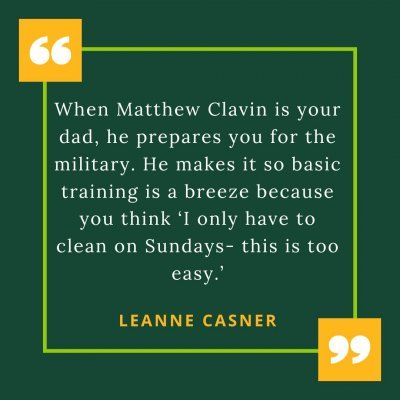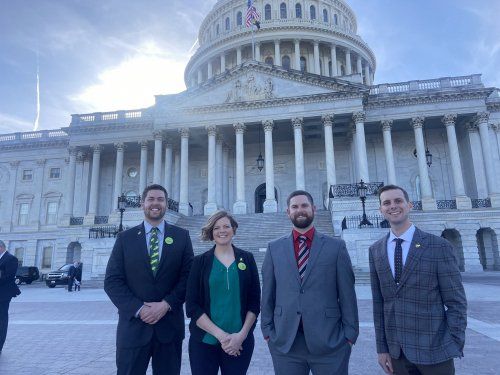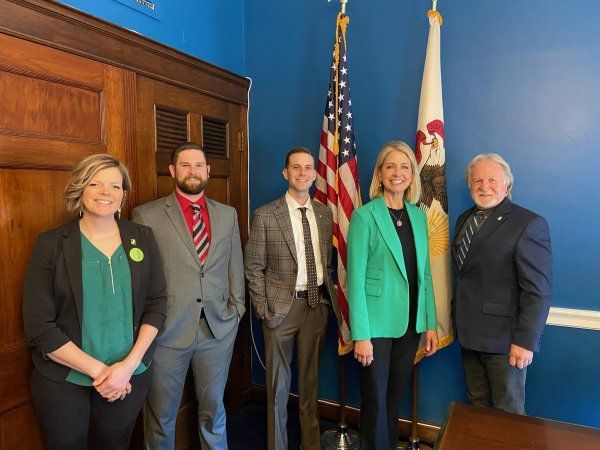Meet Leanne Casner: Veteran, Farmer, and Advocate for Ag

In Leanne Casner’s eyes, military training didn’t hold a candle to her life growing up on a dairy farm.
A veteran farmer, her love for the United States, agriculture, and consumer education made Casner a successful candidate for the IL Corn Growers Association’s GrassRoots Orientation to Washington D.C. (GROW) program. Her first-time trip to the U.S.Capitol bridged her experiences and impacted farm policies.
“Going to D.C. created a lot more pride in what I have done,” Casner said, who served in Iraq. “I don’t tend to think of it as that big of a deal. I did the job I was hired to do at the time and a lot of people’s experiences were a lot more intense than mine was,” she said.
Early Roots in Agriculture
Casner and her siblings were involved in their family’s farm, Clavin Dairy, from a young age. As a seven-year-old in Rosamond, Illinois, Casner helped her family milk 200 dairy cattle three times a day. A 2am alarm clock and a regimented schedule ingrained a work ethic and passion for agriculture Casner takes with her everywhere.
Determined to make her own path, Casner decided to broaden her experiences after high school and join the Army. A career choice she was prepared for because of her involvement on the farm. “When Matthew Clavin is your dad, he prepares you for the military,” Casner said. “He makes it so basic training is a breeze because you think ‘I only have to clean on Sundays- this is too easy.’”


The 2022 U.S. Department of Agriculture’s census reported out of over 300,000 American farmers veterans, only 9% are women. The Clavin Dairy operation works around the clock and requires high-level sterilization to ensure healthy conditions for cattle and milk production. In Iraq, Casner worked twelve hours on and off - a schedule she said she managed well because of her upbringing. “(Iraq) wasn’t that different from dairy farming for me,” she said.
Engaging with Curious Consumers
The military provided an opportunity for Casner to teach her colleagues about her background.“When I was in the military, I will never forget one of the guys thought full-grown cows were the size of their calves, about 80 pounds- like a big dog,” she said. “And I thought, ‘if he never left the city, how would he know?’ It’s a lot more common that people don’t know anything about what goes on in agriculture or how things are done.”
In 2006, Casner returned home and attended college at the University of Illinois- Springfield, all while milking cows full-time. After graduation, she continued her full-time role, back on her family’s farm. Clavin Dairy farm has expanded its reach in recent years hosting tour groups of all sizes. In June 2023, the family welcomed nearly 400 curious consumers to an event held on the farm.
Additionally, Casner began the “Daily Dose of Dairy” a Facebook page debunking common fallacies in agriculture. With over fifteen hundred followers the account says the farm is “always open” no matter the time of day or year. “I don’t like to see the misconceptions,” she said. “Agriculture is definitely a passion of mine. It’s what I grew up with and it’s what my whole family is involved in.”

Her passion for connect with consumers paved the way for Casner to attend Washington D.C. with ICGA’s GROW program.
Casner was one of five agriculturists who visited the offices of all 17 Illinois representatives, both senators, and nearly 60 non-governmental agencies with the grassroots association.The farmers shared personal experiences as they advocated for a farm bill, warned lawmakers of the Environmental Protection Agency’s Multipollutant Rule, and built relationships with industry leaders.
Casner said parallels between consumers and politicians include a common investment in environmental goals. She said it’s her experience farmers are often viewed through an outdated lens. “We are always improving,” she said. “We always try to stay integrated with the time. So, if we can be better with our conservation efforts, we are definitely working towards that.”
With program goals of learning and growing, she said the meetings expanded her understanding of policies impacting farmers and the importance of grassroots advocacy. “It gave me confidence that you can change things if you just speak up and get more involved with what's going on in the government,” she said. “Talk to your legislators. Give them your perspective, because they may not understand how their position directly affects farmers.”
Title Photo Credit: Illinois Farm Families







